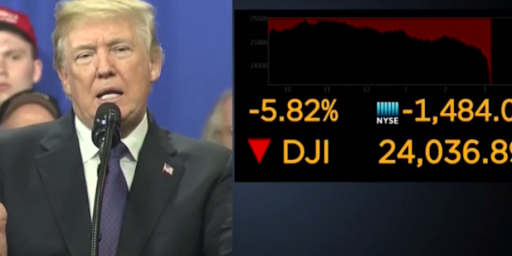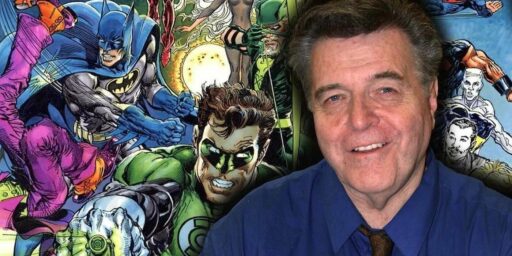Alexander Hamilton
David Brooks [RSS] offers a glowing review of a new book on Alexander Hamilton
Alexander Hamilton was the most progressive, and is the most neglected, of the founding fathers. He was the most progressive because he saw that America could be a capitalist superpower, and he figured out which institutions it would need to realize that destiny.
He is the most neglected, first because he was a relentless climber (and nobody has unalloyed views about ambition), second because he was a great champion of commerce (and nobody has uncomplicated views about that either) and third because his most bitter rivals, Thomas Jefferson and John Adams, outlived him by decades and did everything they could to bury his reputation. So there is no Hamilton monument in Washington. . . .
Is there an Adams monument? I’m sure there is, although I’m unaware of it. There’s not a prominent James Madison monument in D.C. for that matter, unless one counts the university that bears his name.
His greatest achievements came as Treasury secretary. He was confronted by an economically weak and fractious nation. He nationalized the debt, binding the states together and creating the fluid capital markets that are today the engine of world capitalism. He was working at a time when many around him had an entirely static view of economics. They scorned credit, banks and stock markets, and considered manufacturing the least productive form of economic activity.
But Hamilton dreamed of a vibrant economy that would allow aspiring meritocrats like himself to rise and realize their full capacities. He sought to smash the aristocratic fiefs enjoyed by Southern landowners like Jefferson and to replace them with a diversified marketplace that would be open to immigrants and the lowborn. Their vigor, he felt, would drive the nation to greatness. ”Every new scene, which is opened to the busy nature of man to rouse and exert itself, is the addition of a new energy to the general stock of effort,” he wrote.
He started a political tradition, dormant in our own day, in which energetic government doesn’t oppose market dynamism but is organized to enhance it. Today our liberal/conservative debates tend to pit the advocates of government against the advocates of the market. Today our politics is dominated by rival strands of populism: the anticorporate populism of the Democrats and the anti-Washington populism of the Republicans. But Hamilton thought in entirely different categories. He argued that ”liberty may be endangered by the abuses of liberty as well as by the abuses of power.” He wanted a limited but energetic government that would open fields of enterprise and give new directions to popular passions.
The irony is that America’s polity bears far more resemblance to that Hamilton fought for than the one advocated by Jefferson or even Adams. Jefferson is certainly much more lauded, second perhaps only to Washington in our national esteem, but the decentralized–near anarchic–agrarian society that he envisioned has been gone more than a century. While Adams has garnered newfound respect in recent years, the plutocratic society he envisioned has been gone even longer than the one Jefferson fought to preserve. We’re very much more the society of Ray Kroc, Bill Gates, and Sam Walton–and thus Alexander Hamilton–than either of Hamilton’s foes.






Hmmm… the idea of a Hamilton bio intrigues me, after having read John Adams by McCullough (hope I spelled that right) and seen Hamilton portrayed as quite a prick.
Isn’t there a statue of Hamilton in front of the Treasury? Granted, it’s no Lincoln Memorial, but still it is something. I can’t think of as prominent a staute for Adams, for example.
I’m sure there is. And, hell, he’s on the $20 bill. But nothing on the Mall or comparable to even, say, the FDR Memorial.
JMU is in Harrisonburg, Virginia, which is quite a haul from DC.
But yeah, over the long run, the Federalists won: contemporary America is pro-British and relies on a trade-based economy, versus being pro-French and being primarily agrarian. 🙂
Chris: Right you are. I must have been thinking of George Mason or something. There are so damned many schools around here, I just figured Madison must have been one of them!
Hamilton’s on the $10, not the $20.
Also, after his Presidency, Jefferson went 180 and became a supporter of commerce and industrialization.
This account differs greatly on issues of fact from many other books I’ve read.
He characterizes Hamilton’s relationship with Washington in an interesting way and does not even mention his mistress.
Interesting.
BTW Hamilton is on the 10 not the 20
John Adams monument may be just around the corner in Washington:
Story Link
—